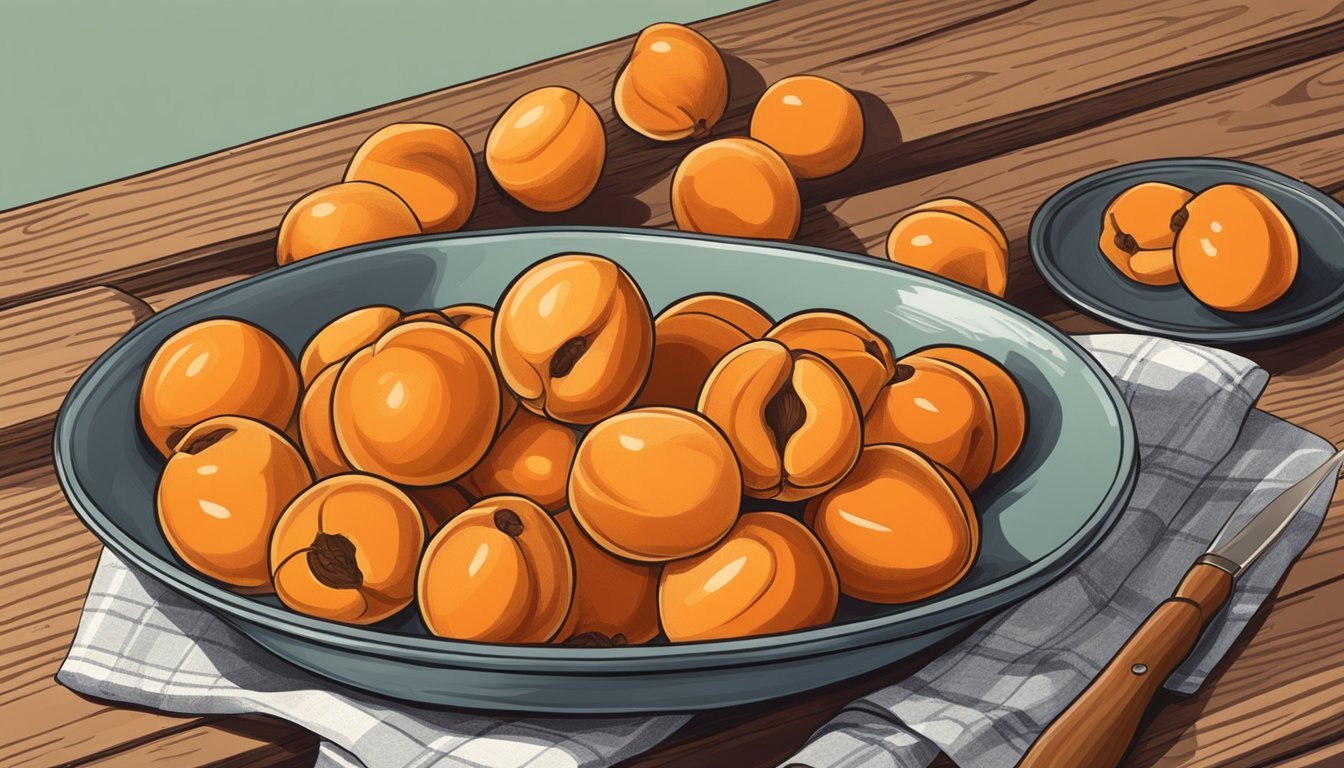Apricots Substitutes
Best Alternatives for Cooking and Baking
For those who find themselves out of apricots but still crave their unique flavor in recipes, worry not; there are several effective substitutes available. Peaches and nectarines are perhaps the most suitable alternatives due to their similar sweet-tart profile. Whether you're baking a pie or preparing a fruit salad, these substitutes can seamlessly replace apricots without compromising the dish’s taste.
Pluots, a cross between plums and apricots, also offer a delightful option when apricots are not at hand. Their juicy sweetness makes them a versatile replacement that can enhance desserts and savory dishes alike. Found in most supermarkets, pluots can be just as easily incorporated into your culinary creations.
Canned apricots present another reliable substitute, especially for cooked recipes where texture plays a lesser role. They can be stored conveniently for longer periods and retain much of the essential flavor needed for your favorite sauces, jams, and baked goods.
Understanding Apricots
Apricots, known for their rich nutrient content and flavorful taste, provide significant health benefits. Their texture and consistency make them versatile in various culinary applications.
Nutritional Profile
Apricots are packed with essential nutrients that support overall well-being. They contain high levels of vitamin A, which is vital for eye health, and vitamin C, an antioxidant that boosts the immune system. The fruit is also a good source of fiber, aiding in digestion and promoting gut health. Additionally, apricots provide potassium, which helps maintain heart health and regulate blood pressure. Antioxidants such as beta-carotene and lutein further enhance its health benefits, protecting the body from oxidative stress.
Flavor Profile
The flavor of apricots is a delightful combination of sweetness and tartness. Fresh apricots have a fruity taste that can vary depending on ripeness. When fully ripe, they are sweet with slight acidity, making them perfect for both savory and sweet dishes. This balance of flavors makes apricots a beloved ingredient in jams, desserts, and salads. Their unique taste can complement a variety of dishes, adding depth and complexity.
Texture and Consistency
Fresh apricots have a delicate yet firm texture, which becomes softer as they ripen. The skin is smooth, and the flesh is juicy and slightly fibrous. When dried, apricots maintain a chewy consistency but become more concentrated in flavor. This versatility in texture allows apricots to be used in multiple culinary contexts, from fresh slices in salads to dried versions in baking and cooking. The consistency of canned apricots is often thicker, making them a convenient and long-lasting substitute for fresh fruit.
Each of these attributes — nutritional value, distinct flavor, and versatile texture — contributes to the apricot's popularity in various culinary and health contexts.
Types of Apricots
There are several forms of apricots available, each offering distinct characteristics and uses. These include fresh apricots, dried apricots, and canned apricots. Each type has unique properties that make it suitable for different culinary applications.
Fresh Apricots
Fresh apricots are typically consumed raw and boast a vivid orange color and soft texture. They are known for their sweetness and mild tartness, making them a versatile ingredient in both sweet and savory dishes.
This fruit is a rich source of vitamins A and C, dietary fiber, and minerals like potassium. Fresh apricots stand out due to their juiciness and are commonly used in salads, desserts, and as snacks. The delicate skin of fresh apricots makes them more perishable, so they should be stored in the refrigerator to maintain freshness.
Dried Apricots
Dried apricots are made by dehydrating fresh apricots, concentrating their flavors, sugars, and nutrients. These dried fruits have a chewy texture and a rich, caramel-like sweetness. They are often used in baking, cooking, and as a snack due to their long shelf life and portability.
They are an excellent source of dietary fiber, vitamins A and E, and potassium. Unlike fresh apricots, the drying process increases the fruit's sugar content, making it sweeter. Due to their durability, dried apricots are ideal for long-term storage and can be kept for months if stored properly in an airtight container.
Canned Apricots
Canned apricots are preserved in syrup or juice, offering a consistent texture and flavor year-round. This method of preservation ensures that the apricots remain tender and flavorful. Canned apricots are a convenient choice for baking, cooking, or adding to salads and desserts.
They are also rich in vitamins and minerals, although some nutrient loss might occur during the canning process. Canned apricots should be stored in a cool, dry place and refrigerated after opening to maintain quality. Their long shelf life makes them a practical option for those who do not have access to fresh or dried apricots.
Substitutes for Fresh Apricots
When fresh apricots are unavailable, several fruits can serve as excellent substitutes. These alternatives match apricots in flavor, texture, and sweetness, making them suitable for various dishes.
Using Peaches
Peaches are one of the closest substitutes for fresh apricots. They have a similar sweet, slightly tart flavor that can seamlessly replace apricots in most recipes.
In fruit salads, peaches replicate the juicy consistency and fruity flavor of apricots. They can also be used in salad dressings, where their smooth texture blends well and adds a sweet note. When substituting, use an equal quantity as you would apricots to maintain the correct balance of flavors in your dish.
Trying Nectarines
Nectarines offer another viable option to replace fresh apricots. They share a firm texture and a comparable sweet yet tangy flavor.
In baking recipes, nectarines can mirror apricots, providing that desired hint of tartness. The skin of nectarines is smoother and does not require peeling, which simplifies preparation for cobbler or crumble. When using nectarines, you can follow a one-to-one ratio with apricots, ensuring your desserts and sauces achieve a similar delightful taste.
Considering Plums
For those looking for a substitute with a slightly more pronounced tart flavor, plums are an excellent choice. They have a firmer texture and are somewhat less sweet than apricots.
Plums can be used effectively in savory dishes, adding a complex tartness that complements various meats and salad dressings. They also work well in jams and sauces, where their unique flavor profile can enrich the overall taste. Depending on the recipe, you might want to adjust the quantity of sweeteners to balance the tartness of the plums.
Opting for Mangoes
Mangoes provide a sweeter, more tropical alternative to apricots. Their creamy texture and sweet-tangy flavor make them a suitable replacement in many apricot recipes.
In smoothies and desserts, mangoes add a rich, exotic flavor that can transform your dish. They also work well in salsas and fruit salads, where their fibrous quality pairs nicely with other fruits. While mangoes are sweeter, some adjustments may be needed in recipes that require a more balanced sweet-tart profile.
These substitutes ensure that your dishes maintain their flavor and texture, even without fresh apricots.
Substitutes for Dried Apricots
There are several viable substitutes for dried apricots that can be easily incorporated into recipes to achieve a similar texture and flavor. Each alternative comes with its own unique benefits and can be used in various culinary applications.
Dried Cranberries
Dried cranberries are a popular substitute for dried apricots. They add a tart flavor profile and chewy texture to recipes.
Nutrient Content: Dried cranberries provide a good amount of fiber and antioxidants.
Usage: In terms of measurement, these can be used in equal amounts to dried apricots. They are especially excellent in salads, baked goods, and savory dishes that benefit from a touch of acidity.
Prunes and Dates
Prunes, also known as dried plums, and dates are two other excellent replacements.
Sweetness & Texture: Prunes are soft and high in fiber, while dates bring a rich sweetness that can elevate the flavor of many dishes.
Nutrient Content: Both are nutritious, offering potassium and other essential vitamins and minerals.
Usage: Use them in equal weights to dried apricots when substituting. They are ideal for recipes that require a moist, chewy consistency, such as muffins, breads, and certain savory dishes.
Dried Figs and Persimmons
Dried figs and persimmons are effective substitutes due to their natural sweetness and unique textures.
Flavor Profile: Figs add a slight chewiness while dried persimmons offer a subtly sweet, floral note.
Nutrient Content: Both types are packed with nutrients, such as calcium and potassium, making them a healthy alternative.
Usage: When substituting, use the same weight as you would dried apricots. They perform well in baked goods, salads, and even as a standalone snack.
Incorporating these substitutes can help maintain the desired taste and texture in various recipes, ensuring an enjoyable culinary experience.
Apricot Puree and Nectar Substitutes
For those seeking alternatives to apricot nectar or puree, diverse options are available that mimic the sweet and slightly tart flavor profile and the consistency needed for various recipes. Two notable substitutes are applesauce and mango or persimmon puree.
Using Applesauce
Applesauce offers a reliable and convenient alternative for apricot nectar and puree. Its naturally sweet taste and smooth texture make it a versatile component in many dishes.
The consistency of applesauce closely matches that of apricot puree, making it easy to swap in recipes without compromising the dish's structure. It is especially effective in baked goods, where maintaining moisture is critical.
Apple juice can also serve as a substitute but is more suitable for liquid applications or drinks, given its thinner consistency. While it has a milder flavor compared to apricot nectar, it integrates well, often enhancing the other ingredients.
Mango and Persimmon Puree
Mango puree stands out due to its rich, exotic flavor that combines sweetness and tartness. Like apricot nectar, mango puree has a similar viscosity, making it ideal for sauces, dressings, and desserts.
Mangoes also bring digestive and antioxidant properties, offering health benefits akin to those of apricots. This substitute works well in recipes where a bold flavor is desired, adding a tropical twist to traditional dishes.
Persimmon puree provides a mellow, sweet flavor with less tang compared to apricot nectar. It works well in baked goods, smoothies, and desserts, where its unique taste can pair beautifully with spices like cinnamon and cardamom.
Persimmons offer a distinct, subtle taste that complements rather than overpowers, making them an excellent choice for delicate recipes requiring a sweet, fruity depth.
Substitutes in Baking and Cooking
When apricots are unavailable, several alternatives can efficiently replace them in various recipes. Suitable options include fruit preserves, syrups, sweeteners, and fruit juices, each bringing unique flavors and textures.
Alternative Fruit Preserves
Fruit preserves like peach preserves, raspberry preserves, and plum preserves are excellent choices in baking and cooking. These preserves maintain a similar consistency and sweetness, making them ideal for recipes such as muffins, pastries, and toast.
Apple jelly and cranberry sauce can also work well, adding distinct flavors to glazes and sauces. Orange marmalade introduces a tangy note, perfectly complementing richer dishes. Each substitution ensures the right balance of sweetness and texture in the absence of apricot preserves.
Syrups and Sweeteners
For a liquid alternative, syrups and natural sweeteners are viable options. Maple syrup, with its rich flavor, pairs excellently with ice cream and baked goods like muffins. Honey offers a floral sweetness that can enhance glazes and sauces.
Agave nectar, known for its mild flavor, is versatile in various recipes and works well in place of apricot jam in pastries. These substitutes not only provide sweetness but also contribute to the desired consistency, ensuring the recipe's success.
Fruit Juices
Fruit juices such as apple juice, pear juice, peach juice, and mango juice serve as effective substitutes for apricot nectar. They add moisture and flavor to recipes, making them suitable for baking and cooking.
Cranberry juice can offer a tart alternative that pairs well with savory dishes or glazes. Each juice brings its characteristic flavor, allowing for creativity while maintaining the recipe's essential components. These juices ensure that the final product remains delicious and well-balanced.
Considerations When Substituting Apricots
When substituting apricots, it is important to account for differences in flavor, texture, and nutritional aspects. Each substitute brings unique characteristics that might affect the final dish.
Flavor Balance
Apricots have a natural sweetness with a hint of tartness. When choosing a substitute, consider the flavor profile to maintain the desired balance. Apples, for example, have a slightly more complex and tart flavor and may require additional sweeteners to replicate the taste of apricots.
Peaches and nectarines often serve as good substitutes due to their similar sweet and tangy notes. Dates or prunes can also be used, but they are typically sweeter and might need some adjustments to the recipe's other ingredients.
Texture Compatibility
The texture of apricots is firm yet juicy when fresh and somewhat chewy when dried. When substituting in recipes, fresh peaches or plums can mimic the juiciness of fresh apricots. Dried fruits like dates or raisins can replicate the chewy texture of dried apricots.
If using fresh fruit in place of dried apricots, be mindful of the water content. Fresh fruits can add more moisture, so recipe adjustments may be necessary to avoid overly soggy outcomes. Peaches and persimmons can be effective for maintaining a similar consistency.
Nutritional Aspects
Dried apricots are rich in dietary fiber, antioxidants, potassium, and vitamins such as vitamin A and iron. When selecting substitutes, it’s beneficial to choose options that offer comparable health benefits.
Dates, for instance, are high in fiber and potassium, making them an excellent alternative. Fresh peaches and plums also provide a good vitamin content, though they may not match the exact nutritional profile of dried apricots. Balancing nutritional values ensures that the health benefits of the original ingredient are retained.
The Bottom Line
Finding the right apricot substitute can be straightforward with the variety of options available.
Fruits like peaches, nectarines, and mangoes are excellent replacements, offering similar textures and sweetness. These fruits can be used fresh in salads, baked goods, or sauces. Using mangoes brings a balance of sweet and sour highlights, making them versatile in both savory and sweet dishes.
For those seeking substitutes for apricot preserves, alternatives such as orange marmalade and plum jams work well. Orange marmalade can be used in a 1:1 ratio with an added teaspoon of honey or sugar. For plum jams, a teaspoon of lemon juice and a pinch of ground ginger can enhance the flavor.
When it comes to measurements, understanding the equivalent portions is crucial:
1 pound fresh apricots = 8 to 12 whole fruits
2 1/2 pounds fresh apricots = 2 to 3 pints frozen
6 pounds fresh apricots = 1 pound dried apricots
Often, these substitutes not only replace apricots but also introduce new flavors and nutritional benefits, making them an integral part of varied culinary adventures.







